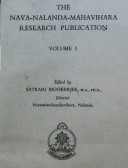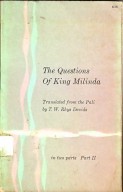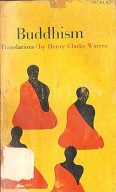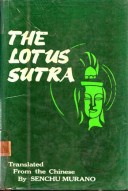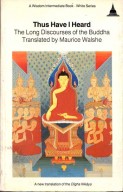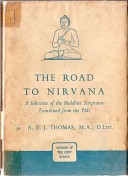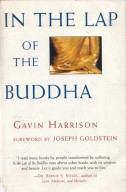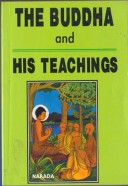Tìm Sách
Sách tiếng Anh-English >> The Nava-Nalanda-Mahavihara Research Publication Vol. I
Thông tin tra cứu
- Tên sách : The Nava-Nalanda-Mahavihara Research Publication Vol. I
- Tác giả : Satkari Mookerjee
- Dịch giả : Director Navanalandamahavihara, Nalanda
- Ngôn ngữ : Anh
- Số trang : 397
- Nhà xuất bản : S.C Chose at Calcutta Press Private Limited
- Năm xuất bản : 1957
- Phân loại : Sách tiếng Anh-English
- MCB : 1210000004794
- OPAC :
- Tóm tắt :
Edited by Satkari Mookerjee MA. ,PH. D
Director Navanalandamahavihara, Nalanda : Institutes for the resuscitation of India’s old culture for the scientific study of Buddhist learning and culture
PREFACE
The present work constitutes the Volume I of “The NAVANALAND AM AHAVIHAR A RESEARCH PUBLICATION”. It is the result of a team work in which the contributions of several scholars Bare embodied. The scholars chose their own subjects and almost all the papers relate to Buddhist learning, except one paper which discusses an interesting problem of Panini’s grammar. I do not think that an apology is necessary for this apparently non-Buddhist dissertation. The old Nalanda Mahavihara was a centre of SANSKRIT LEARNING and catholic in its academic interests. It fostered the study of the Vedas, medical science, grammar, logic Brahminical and Buddhistic, and all other branches and subjects which engaged scholars’ attention of the time. It may suffice to observe that Panini’s grammar had a special fascination for the scholars of old Nalanda University, and every student was required to make a special study of it since SANSKRIT was the medium of instruction, and the Sãstras and other works produced by the old University were all composed in SANSKRIT. Of course Pali, Apabhramla and Prãkrita, and what has been called HYBRJD SANSKRIT by Professor Edgerton were also studied and understood by the scholars.
We now propose to give a brief survey of the contents of this Volume. The first paper is a monograph entitled ‘The Absolutist’s standpoint in Logic’. It discusses an interesting and intriguing problem which scepticism and metaphysical absolutism necessarily entailed because of their denial of the validity of the logical categories. This problem could not have arisen if formal consistency alone had been deemed a justifiable logical criterion. But even the sceptics could not give a wide berth to the commitment of Indian logic to the material I truth of the syllogistic argument. It may not be idle to presume that this problem of Indian logic will have an interest for the modem mind.
Dr. Tatia has contributed a paper on the theory of causation, the famous doctrine of Pratityasamutpada. He draws upon the Visuddhimagga of Buddhaghosa which has become a classic of the Pali Abhidhamma. It is a faithful representation of the theory of Pratityasamutpãda as understood and expounded by the Theravada school of Southern Buddhism.
The third contribution is made by Dr B. Jinananda. He makes a comparative study of the Sanskrit Vinaya with the Pali Vinaya and discusses the relative merits of the two versions in an objective way.
The fourth paper is contributed by Sri Y. Kajiyama who was associated with our Institute for over two years as Lecturer in Japanese and Chinese. He discusses the logical position of the Svãtantrika school founded by Bhãvaviveka. Bhavaviveka criticizes the negative, non-committal and hypothetical logic of Buddhapâlita and contends that logic must receive ungrudging recognition even from the Mãdhyamika philosopher. The phenomenal truth must have a status in philosophical speculations and it is a scaffolding to the ultimate Truth. Bhavaviveka’s position is the least represented in English and the Sanskrit original texts are no longer extant. Professor Kajiyama derives his data from Tibetan and Chinese literature. We trust that it will clear up the misunderstanding caused by the one-sided representation of the position of a celebrated philosopher and that again by an undisguised opponent, viz., Candrakĩrti.
The fifth article deals with the strictures on Pãnini and his school by ancient critics as represented by Kumarila and Jayantabhatta as the pũrvapaksa, the prima facie position. A systematic representation of this position in a modem language was a desideratum. The subject is a technical one; but because Panini’s grammar has universal appeal, the article, it is hoped, will not fail to be of interest to Sanskrit scholars.
The last contribution is from Professor Dr Sitamsusekhara Bagchi of the Mithila Research Institute. He has given a free English rendition of Vasubandhu’s Vimsatikã, the oldest philosophical work on Vijnanavada known to us. It is the contention of Vasubandhu that our normal experience can be fully accounted for without the persupposition of an extra-mental objective reality. The original work is a classic and has been quoted and criticized by uddyotakara who cannot be dated later than the sixth century A.D. Dr Bagchi has also edited the original text with annotations. This will satisfy a real want, because the edition of Professor Sylvain Levi is long out of print and not available in the market. The importance of Dr Bagchi’s contribution is bound up with that of the original work, and our trust that it will facilitate the understanding of an abstruse text may not be unwarranted.
In order to enable a modem scholar to assess the value and fidelity Hof the representation in English we have given some original Sanskrit texts as an appendix. It was also thought necessary to give the Sanskrit texts as they are not easily available. The articles are faithful to the thoughts and not always to the language. The old thoughts again have been presented in a modem way in a modem idiom. Indian thought has to be presented to the modem world and made intelligible to the modem mind. It has not only an antiquarian interest but also a perennial value in that the problems discussed are evergreen. They have not ceased to be problems notwithstanding the advance made by the modem mind in speculative thought. We propose to present a side of Indian speculations in the past in a manner more or less modem, which may be justified by the consideration that our attempt has not been forestalled by a predecessor. We end our apology by quoting the words ofjayantabhatta:
Kuto vã nũtanam vastu vayamutpreksitum ksarnah,
Vacovinyãsavaicitryamãtram atra vicãryatãm.
(Nyayamanjari)
The scholar has to pursue the pedestrian method of caution and slow movement necessitated by his obligation to avoid a statement which cannot be verified by objective data. He cannot create facts, nor can he put his own ideas in the mouth of the old thinkers whose thoughts he professes to present to the academic world. At most he can put the ‘old wine in a new bottle; but to put the new wine in the old bottle will be an act of infidelity. These are the limitations of a scholar and we have sedulously restrained ourselves from transgressing these limitations. It is for the academic world to pronounce judgement on the value of the labour undertaken by the scholars of our Institute.
The Government of Bihar have founded three Institutes for the resuscitation of India’s old culture, among which the NAVANALANDAMAHAVIHARA stands for the scientific study of Buddhist learning and culture, (2) the Mithila Research Institute for Sanskrit learning with its emphasis upon the Brahminical schools, (3) and the Vasali Institute for Prakrit and Jainology. The Government are anxious that these Institutes should foster researches on the subjects! of their interest. The present Publication is an endeavour in this line. Our gratitude to the Honourable Acharya Badri Nath Varma, Minister of Education, and the Education Department of the Government of Bihar for their encouragement and their appreciation of our difficulties cannot be expressed in adequate terms. Our language will fail to represent our feelings.
NALANDA S. Mookerjee
31st March, 1957.
CONTENTS
- The Absolutist’s Standpoint in Logic Dr S Mookerjee
- Patticcasamuppãda Dr N. Tatia
- Mahãvagga Mahãvastu and Lalitavistara Dr B. Jinananda
- Bhãvaviveka and the Prãsangika School Sri Y. Kajiyama
- Kumarila’s Reaction to Strictures on Certain apparent
Grammatical Lapses
Sri T. Venkatacharya
- Vijnaptimatratasiddhi
Dr Sitamsusekhara Bagchi
Index
 Facebook
Facebook
 Google
Google
 Google+
Google+
